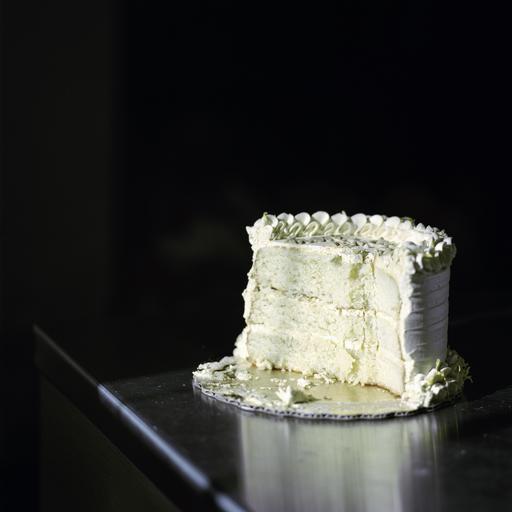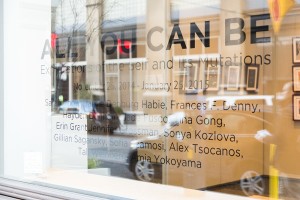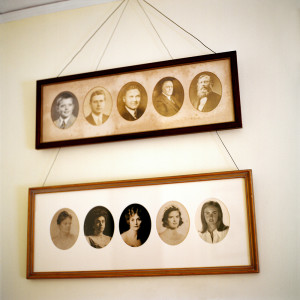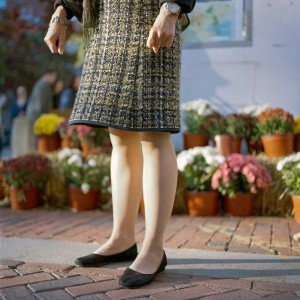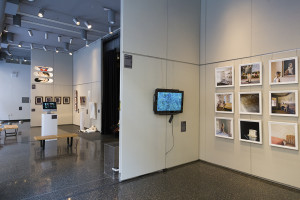Frances F. Denny’s Let Virtue Be Your Guide
This week I’ve been chatting about family, femininity and the decline of the Protestant elite with Frances F. Denny, a photo-based artist who lives in Brooklyn. Nine pieces from her series Let Virtue Be Your Guide are included in the all-women exhibition at NYU‘s Gallatin Gallery, “All You Can Be” on view through Jan. 25th, 1 Washington Place, New York, NY.
Gallatin Gallery, NYU. “All You Can Be” 2015
Frances F Denny: How have you been?
Liz Sales: Good. Well, actually, my mom fell through the attic floor. She’s okay but things have been…
FFD: Oh, my God! Is she alright?
LS: She is going to be alright. It sounds so crazy out loud, “My mom fell through the attic floor.” I think that’s why I keep saying it. But, I’m over-sharing. That’s actually probably a good segue.
As an over-sharer, I feel a little anxious around your work: In Let Virtue Be Your Guide, your subjects, your family and friends, are unmistakably reserved, New England WASPs. I, on the other hand, am totally incapable of refraining from telling everyone everything that’s going on in my life. We’ve set aside this time to talk about you and your practice and I haven’t stopped talking about myself. I can feel the people in your pictures silently judging my poor manners.
FFD: That’s great! I want there to be something about the work that is a little bit unnerving, a little bit wrong. The aesthetics of New England have been co-opted by fashion labels, but I’m not trying to make a Ralph Lauren catalog. Do you know what I mean?
LS: Absolutely. Do you remember the Abercrombie & Fitch catalogs?
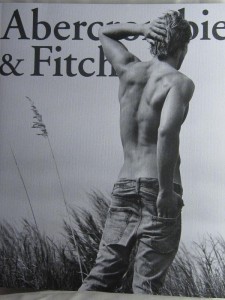 AF Abercrombie and Fitch Magazine. Issue 183. Spring Break, 1997
AF Abercrombie and Fitch Magazine. Issue 183. Spring Break, 1997
FFD: Yes! I remember saving up my allowance to buy them. I would cut them up and tape the pages to my walls so I could covet the boys and the clothing.
LS: What do you have on your walls these days?
FFD: Nothing, I moved to a new studio last week.
LS: That’s right. I can’t picture you in a studio. I was wondering what it is you do there?
FFD: That’s a really good question. None of this work was shot in a studio. I’m beginning a new project, surrounding ’90s girlhood, which is more studio-based.
LS: You’ve worked with images of Disney princesses in the past.
FFD: This is coming from the same place. I’m thinking about the life of objects that act as a sort of prescription for femininity because I am both attracted to and critical of these things. I could say the same about WASP culture. It makes me uncomfortable but it is a part of me. So, I would like to put some critical distance between these things and myself.
LS: How do your subjects feel about that? How did you explain this project to them? And then, how do they feel now that they’ve seen it?
FFD: My immediate family understands the project best. They are used to being in front of my camera. They understand what I am doing and I appreciate that they have been obliging about almost every single image. My broader circle of family and friends know that I’m interested in documenting this WASP culture and are puzzled but, at the same time, excited to help me. I’m honestly so grateful to all of them.
Frances F. Denny, Inheritances, 2013
LS: Your title comes from a piece if embroidery?
FFD: “Let Virtue Be a Guide to Thee” was the title of a 1982 Rhode Island Historical Society exhibition of colonial girls’ embroidery samplers. I discovered the catalog in a library and I began thinking about this word “virtue.” I feel like is not a commonly used word so much anymore.
LS: I hear it used ironically.
FFD: Right, exactly, because, historically it’s about chasteness, the preservation of virginity. But I wonder, what does it mean to live a moral life as a woman today?
LS: Did you have a religious upbringing?
FFD: Not at all. I’m not even baptized. But, I’m interested in various ideals placed on women. I’m interested in models for perfection, whether it is New England’s or Disney’s. I’m reading Roxane Gay’s book Bad Feminist, and there is a passage that expresses what I am after:
“I embrace the label of bad feminist because I am human. I am messy. I’m not trying to be an example. I am not trying to be perfect. I am not trying to say that I have all the answers. I am not trying to say that I’m right. I am just trying – trying to support what I believe in, trying to do some good in this world, trying to make some noise with my writing while also being myself…”
I like the idea of being an imperfect feminist. I think a lot of my work is about how I fail at being a feminist, at least in the way we think a feminist is “supposed” to be. I’m interested in the struggle to be a good woman, to be virtuous, to be a feminist, in whatever ways you define those things.
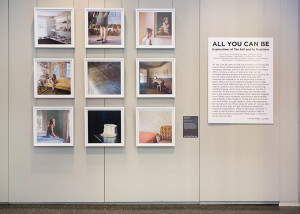
Gallatin Gallery, NYU. “All You Can Be” 2015
LS: Why don’t you appear in your images?
FFD: I used to. I definitely went through a period of doing self-portraits—my obligatory Francesca Woodman phase. I think vanity can get in the way of working with self-portraits. I wanted to disrupt that. If I was looking at a contact sheet filled with pictures of myself, how would I be sure I was selecting the most meaningful image? I think I use the outside world as a way of shooting self-portraits now.
LS: That’s a really interesting answer. So, the image of the half-eaten wedding cake is—
FFD: It’s a birthday cake. It resembles a kind of crumbling edifice. I see the WASP world disappearing.
There’s an article by Noah Feldman, a law professor at Harvard about the decline of the Protestant elite, which is a positive thing, because it was a kind of unofficial American aristocracy for a long time.
Frances F. Denny, My Mother’s Hands, 2012
LS: You’ve talked about this lineage as being passed down from one woman to another, so I am curious about your relationship with your mother, both as a mother and a subject.
FFD: I’m asked that often. We have a good relationship. She understands the pressures that I’m trying to express in the work, because she feels them, too. More and more, she understands the project and she plays the part of this particular woman in this particular world. I think of my Mom as a collaborator.
LS: Me too.
Gallatin Gallery, NYU. “All You Can Be” 2015
